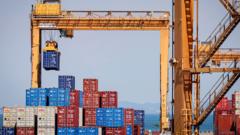The World Trade Organization has revised its forecast for global trade, anticipating a decline this year, predominantly driven by tariffs imposed by the United States. WTO chief Ngozi Okonjo-Iweala expresses grave concerns over the deteriorating US-China relations and their broader implications for international trade.
WTO Warns of Global Trade Decline Amid US-China Tensions

WTO Warns of Global Trade Decline Amid US-China Tensions
The World Trade Organization projects a drop in global trade due to US tariffs, signaling potential economic turmoil.
The World Trade Organization (WTO) has issued a stark warning that global trade is set to decline this year, primarily due to the tariffs imposed by the United States under President Donald Trump. In a press conference held in Geneva, WTO Director-General Ngozi Okonjo-Iweala highlighted what she described as "really worrying" trends in US-China relations, which are further destabilizing global trade dynamics.
The WTO’s forecast indicates that trade is expected to drop by 0.2%, a significant departure from prior expectations of a 2.7% increase in 2025. The decline is anticipated to be particularly pronounced in North America, where trade could fall by over 10%. Chief economist Ralph Ossa remarked on the pervasive uncertainty surrounding trade policies, suggesting that this uncertainty dampens overall trade flows, resulting in reduced exports and stunted economic growth.
Coinciding with the WTO's findings, the United Nations Conference on Trade and Development (UNCTAD) released a report projecting a slowdown in global growth to 2.3% by 2025, a figure that falls below the 2.5% threshold frequently associated with looming recessions.
The imposition of a baseline tariff of 10% on most foreign imports to the U.S. took effect on April 5, with specific exemptions. In contrast, China faces significantly higher tariffs totaling 145% on numerous goods. Following the announcement, U.S. stock markets reacted negatively, indicating caution amidst increasing uncertainty about trade relations.
Despite the predicted downturn for U.S. trade, the WTO foresees opportunities for modest growth in regions such as Asia and Europe, suggesting that trade dynamics remain complex and regionally diverse. For the first time, the WTO's report includes a forecast for services trade, estimating a growth of 4% by 2025, which is slightly lower than previous projections.
Since Trump took office, his administration has frequently altered its stance on tariffs, creating an unpredictable environment for global commerce. While Trump argues that these import taxes will bolster the U.S. economy by encouraging domestic consumption and investment, critics contend that such measures are likely to complicate the return of manufacturing jobs to American soil, extending the path to full economic recovery.
As U.S.-China tensions continue to escalate, the ramifications of these tariffs are likely to shape the future of global trade for years to come.





















